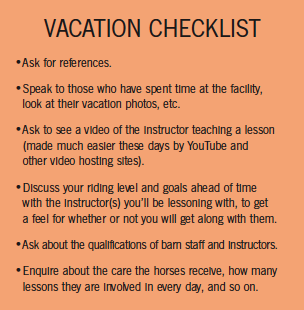Who says you can’t have horses with you on vacation? Check out these tips for planning the perfect equine getaway.
As we head into the dreary months of winter, you may start daydreaming about sunny beaches and exotic locations. Or perhaps you’re planning what holidays you’ll take in the upcoming year. With an increasing number of locations offering an equine vacation or camping, incorporating horses into your plans is becoming easier and easier.
Roughin’ it
I have a saying: “I don’t do rustic”. Taking a camping vacation with my equine partner conjures up images of horses ground tied in a clearing with riders in sleeping bags around a campfire. You probably will never catch me doing this – the mere thought makes me itchy. Thankfully, horse camping is becoming increasingly, shall we say, modernized. While you can still go all-out roughing it, there are also places where you can rent a cabin with an attached corral, pop a tent, or park your fantastic horse trailer with customized living quarters. When camping with your horse, don’t forget to bring the following:
• Hay
• Grain – if your horse requires it. An easy solution is to make up each of your horse’s meals in a Ziploc bag for easy feeding, rather than hauling along bags of grain.
• Water – if you are not taking any with you, check to make sure the water at the campsite is potable. If your horse is the picky type, consider adding apple cider vinegar or apple juice to the water.
• Buckets – and a way to hang them.
• Somewhere to keep your horse – a portable corral or picket line. Some campsites provide portable pens.
• Rainsheet
• Well fitting tack – riding for prolonged periods on varied terrain in ill-fitting tack is a recipe for an unsound horse.
• Flyspray – and sunscreen if your horse has a pink nose.
• Saddlebag – which you can back with snacks, water, etc.
• Small portable horse/human first aid kit
• Hoof boot – in case your horse loses a shoe or gets a stone bruise.
• Cellphone, GPS and compass
• Flashlight, matches
• Muck bucket and manure fork – so you can clean up after your horse.
Just for fun
For those who don’t want the work of looking after their own horses while on vacation, and are not all that serious about improving their riding abilities via lessons while on holidays, there are plenty of places that have their own horses and offer inclusive accommodation packages with trail riding opportunities in gloriously scenic locations.
Be sure to consider the following when planning a vacation like this:
• Book through a trustworthy tour operator.
• Check to make sure the staff at the facility are well qualified.
• Check on the level of care the horses receive. Some facilities do not care for the trail horses appropriately, letting their feet get in poor shape, fitting them with uncomfortable tack, overworking them, and/or not attending to their nutritional needs. People who are not used to being around horses may not see these things, but those of us who are will most certainly notice an uncomfortable horse. Sights like this take all the fun out of a ride.
• Consider your riding and fitness levels. If you are not a regular rider, a two-day trek through the mountains will likely leave you very uncomfortable.
• Pack very comfortable boots with an appropriate heel, breeches (jeans can rub uncomfortably on long rides), half chaps, gloves, sweaters/lighter shirts for layering, and rain gear.
• Safety first! Before you go, ask what safety gear will be available for your use at the facility. If they do not provide helmets, take your own (this can often be a good idea anyhow as you never know what their helmets have been through). You may also consider taking a safety/crash vest, if you are riding an unfamiliar horse over challenging terrain.
Working on vacation
While it may sound like an oxymoron, an increasing number of facilities offer more serious riding vacations, in which competitive horsepersons (or those just looking to improve their riding skills) can take a number of lessons each day on schoolmaster horses with advanced instructors. This is most commonly offered to dressage riders.
 These types of holidays can be fantastic opportunities for those who do not have constant access to high level instruction in their own area – you can travel to a new place, enjoy luxurious accommodations, great food, and rewarding lessons. When looking for a place to advance your riding, look at it no differently than you would a boarding/lesson facility in your own area. It may be a bit more difficult, as in most cases you cannot physically check out the facility ahead of time, but use the checklist on this page to help you make your final decision.
These types of holidays can be fantastic opportunities for those who do not have constant access to high level instruction in their own area – you can travel to a new place, enjoy luxurious accommodations, great food, and rewarding lessons. When looking for a place to advance your riding, look at it no differently than you would a boarding/lesson facility in your own area. It may be a bit more difficult, as in most cases you cannot physically check out the facility ahead of time, but use the checklist on this page to help you make your final decision.
Planning an equine vacation can involve a fair bit of time and research, but once you’ve done your homework it can be an incredibly fun and memorable experience. You might learn about a new culture or riding philosophy, increase your riding experience, and make some great friends. Not to mention, get away from barn chores for a week or two!







